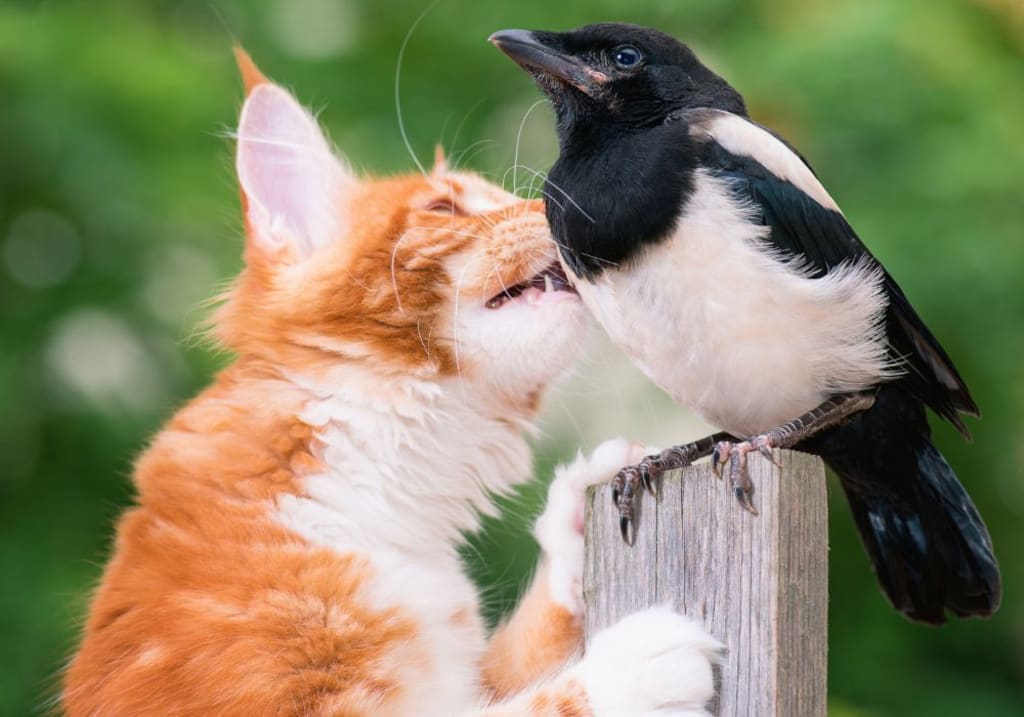Keeping Your Feline Friend from Feathered Prey
A Comprehensive Guide

As any cat owner knows, our feline friends have an innate instinct to hunt. While this natural behavior is fascinating to observe, it can pose a serious threat to local bird populations. If you're a cat parent concerned about your pet's impact on wildlife, fear not - there are several effective strategies you can employ to curb your cat's hunting habits and protect our feathered friends.
In this comprehensive guide, we'll explore the reasons behind a cat's hunting drive, outline practical steps to discourage this behavior, and provide tips to enrich your cat's life in a way that satisfies their predatory instincts without harming local bird populations. By the end of this article, you'll be equipped with the knowledge and tools to keep your feline friend happy and bird-safe.
Understanding the Feline Hunting Instinct
To effectively manage a cat's hunting behavior, it's essential to understand the underlying drivers behind this natural inclination. Cats, being obligate carnivores, have evolved to be skilled hunters, relying on their keen senses, agility, and predatory instincts to capture prey. This hunting drive is deeply ingrained in a cat's DNA and serves as a vital part of their survival mechanism.
In the wild, a cat's hunting behavior is essential for obtaining food and ensuring their continued existence. However, in the domestic setting, where food is readily available, this innate drive can manifest in the pursuit of birds, small rodents, and other wildlife. Cats are natural-born predators, and their hunting instincts can be difficult to suppress entirely.
The Impact of Cats on Bird Populations
The impact of domestic cats on bird populations is a topic of growing concern among conservationists and wildlife enthusiasts. Studies have shown that cats, both indoor and outdoor, are responsible for the deaths of billions of birds each year. This staggering figure highlights the significant threat that feline predation poses to avian species, many of which are already facing habitat loss and other environmental challenges.
While it's important to note that cats are not solely responsible for the decline of bird populations, their hunting behavior can have a disproportionate effect, especially on vulnerable or endangered species. As responsible pet owners, it's our duty to mitigate the impact of our feline companions on local wildlife, and this starts with understanding and addressing their hunting instincts.
Strategies to Discourage Hunting Behavior
Fortunately, there are several effective strategies you can employ to discourage your cat's hunting behavior and protect local bird populations. By implementing a combination of these approaches, you can help your feline friend channel their natural instincts in a more positive and eco-friendly direction.
1. Provide Enrichment and Stimulation
One of the most effective ways to curb a cat's hunting behavior is to ensure they have ample opportunities for physical and mental stimulation. Cats are highly intelligent animals, and a lack of enrichment can lead to boredom, which can then manifest in destructive or predatory behaviors.
To keep your cat engaged and satisfied, consider providing a variety of toys, scratching posts, and interactive playtime. Invest in puzzle feeders or treat-dispensing toys that challenge your cat's problem-solving skills. Additionally, set aside dedicated playtime each day, using wand toys or laser pointers to encourage your cat's natural hunting instincts in a controlled and safe environment.
By providing your cat with ample enrichment and stimulation, you can help satisfy their predatory drive without directing it towards local bird populations. This not only benefits the birds but also helps keep your cat mentally and physically stimulated, reducing the likelihood of unwanted hunting behaviors.
2. Restrict Outdoor Access
One of the most effective ways to prevent your cat from hunting birds is to limit their access to the outdoors. Keeping your cat indoors, or in a secure, enclosed outdoor space like a catio, can significantly reduce their opportunities to pursue and capture birds.
While some cat owners may be hesitant to keep their feline friends exclusively indoors, it's important to weigh the potential risks to local wildlife against the potential risks to your cat's safety when allowed to roam freely. Outdoor cats face a higher risk of injury, illness, and even death due to factors such as traffic, predators, and infectious diseases.
If you do choose to allow your cat supervised outdoor time, consider using a leash or harness, or creating a secure, enclosed outdoor space like a catio. This allows your cat to enjoy the fresh air and natural stimulation while keeping them safely away from bird populations.
3. Use Deterrents and Aversive Stimuli
In addition to providing enrichment and restricting outdoor access, you can also employ various deterrents and aversive stimuli to discourage your cat's hunting behavior. These methods work by creating an unpleasant association between the act of hunting and a negative consequence, ultimately discouraging the behavior.
One effective deterrent is the use of motion-activated devices that emit loud noises or release a burst of air when your cat approaches a specific area. These devices can be strategically placed near bird feeders or other areas where you've observed your cat hunting, creating an unpleasant experience that your cat will learn to avoid.
Another option is to use citrus-scented or bitter-tasting sprays on surfaces or objects that your cat may be tempted to hunt. Cats have a strong aversion to certain smells and flavors, and this can deter them from approaching and engaging with potential prey.
It's important to note that while these deterrents can be effective, they should be used in conjunction with other strategies, such as providing enrichment and restricting outdoor access. Relying solely on aversive stimuli may not address the underlying causes of your cat's hunting behavior and could potentially lead to stress or anxiety.
4. Train Your Cat to "Leave It"
One of the most effective ways to discourage your cat's hunting behavior is to train them to "leave it" when they encounter a bird or other potential prey. This command-based training teaches your cat to ignore the prey and redirect their attention to you or a toy instead.
To begin this training, start by introducing the "leave it" cue in a low-distraction environment, such as your home. Offer your cat a treat, then quickly move it away and say "leave it." Reward your cat with praise and a different treat when they comply. Gradually increase the difficulty by using more enticing items, such as a feather or small toy, and practicing the command in different environments.
Consistency is key when teaching the "leave it" command. With patience and positive reinforcement, your cat will learn to ignore their hunting instincts and redirect their attention to you or a toy when they encounter a bird or other potential prey. This training not only helps protect local wildlife but also strengthens the bond between you and your feline companion.
Enriching Your Cat's Life
While the strategies outlined above can be effective in discouraging your cat's hunting behavior, it's essential to remember that cats are complex, intelligent animals with diverse needs. Simply preventing them from hunting may not be enough to keep them happy and fulfilled.
To truly address the root cause of your cat's hunting instincts, it's important to provide a stimulating and enriched environment that caters to their natural behaviors and needs. This can include:
Providing Vertical Space
Cats are natural climbers and love to survey their territory from elevated vantage points. Installing cat trees, shelves, or window perches can give your feline friend the opportunity to satisfy this instinct while keeping them away from potential bird prey.
Encouraging Scratching Behavior
Scratching is an essential part of a cat's natural behavior, and providing appropriate scratching surfaces can help prevent them from targeting furniture or other household items. Invest in high-quality scratching posts, pads, or trees to give your cat a suitable outlet for this behavior.
Introducing New Toys and Experiences
Cats can quickly become bored with the same old toys and routines. Regularly introducing new toys, puzzle feeders, or even changing the layout of your home can help keep your cat mentally stimulated and engaged.
Considering a Catio or Outdoor Enclosure
If you're unable to keep your cat exclusively indoors, consider creating a secure, enclosed outdoor space like a catio. This allows your cat to enjoy the sights, sounds, and smells of the outdoors while keeping them safely away from birds and other wildlife.
By addressing your cat's physical and mental needs through enrichment and positive reinforcement, you can help channel their natural hunting instincts in a way that benefits both your feline friend and the local bird population.
Conclusion
Keeping your cat from hunting birds is a multifaceted challenge that requires a combination of strategies and a deep understanding of your feline companion's natural behaviors and needs. By providing ample enrichment, restricting outdoor access, using deterrents, and training your cat to "leave it," you can effectively discourage their hunting habits while ensuring their overall well-being.
Remember, the goal is not to completely suppress your cat's natural instincts, but to find a balance that allows them to thrive while protecting local bird populations. With patience, creativity, and a commitment to responsible pet ownership, you can keep your feline friend happy and bird-safe.
For more information on creating an enriched environment for your cat and other pet care tips, be sure to visit Innovate Analysis. Their comprehensive resources can help you navigate the challenges of responsible pet ownership and ensure your furry friend lives a fulfilling and eco-friendly life.
About the Creator
Hasan
Welcome...
In this site of mine you can learn amazing things and many information that you don't know so please subscribe to my site.
Enjoyed the story? Support the Creator.
Subscribe for free to receive all their stories in your feed. You could also pledge your support or give them a one-off tip, letting them know you appreciate their work.






Comments
There are no comments for this story
Be the first to respond and start the conversation.